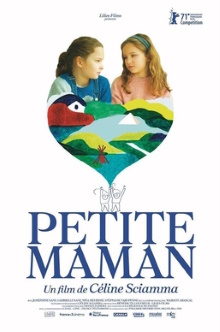Céline Sciamma is rapidly becoming my favorite modern French director with her women-focused films. Here is another, about the relationship between a child and her mother told in a manner surely no one will expect. I love how complete and perfect this work is: the excellence of the performances of the two child actresses who carry the film, the accurate yet subtle insight into how children are dismissed by adults and all of it in a package only a little over an hour. It’s a wonderful example of compact, economical filmmaking that I will recommend to everyone I know.
Eight-year-old girl Nelly solemnly makes the rounds in an elderly retirement home to say goodbye to each of the residents. Afterwards her mother Marion takes her to spend the night in an empty house. We realize that Nelly’s grandmother, that is Marion’s mother, has passed away. They are there to clear out her belongings from the house. The next morning Nelly is disappointed to find that her mother has left and her father is there instead. As her father works to clear the house, she is left to play by herself outside. In the woods, she sees another girl around her own age lugging around large branches. Nelly helps her and it turns out that she is trying to build a fort. The other girl introduces herself as Marion and they become friends. When it starts raining, Marion invites Nelly to take shelter as the former’s house. As they arrive, Nelly realizes that it is another version of her grandmother’s house and somehow this child Marion is her own mother as she was in the past.
You figure out the twist easily enough and so does Nelly though she keeps quiet about her realization until very late in the story. The film never explains how the apparent time travel works and this is the right decision as it is not important. Nelly accepts it at face value and so should the audience. The real magic lies in how it allows Nelly and Marion, daughter and mother, to interact with each other as friends of around the same age. Knowing what we do, and that Nelly somewhat resents her mother for being away from her so often, there is a quiet power in having the child Marion heat up some hot chocolate and awkwardly pour it for Nelly. Though she tries to play by herself, we can see that Nelly is lonely and wishes that she had siblings. When Marion too agrees that she would like siblings as well, one can imagine how much of a revelation it is to Nelly. During the short time they share together they become best friends, messily making pancakes, creating and acting out their own play, working on the fort. In this way, Nelly gets the quality time with her mother she’d always longed for, but as peers and friends instead of a child and her parent. She also discovers new things about Marion she never knew before, that she’d always wanted to be an actress and that she had to go for a scary operation to forestall the onset of some unspecified medical condition. It really is a unique and wonderful way to develop a relationship between a child and the mother she never knew very well.
The director’s keen insight on interpersonal relationships is much in evidence here. Nelly tells her father that the adults never talk to her. When he responds that they do talk all the time, she points out that it’s never about the important things that matter. Indeed she doesn’t understand the decisions her parents make, such as why her mother needs to go away. The child Marion doesn’t know the details of the medical operation she has to undergo either so the two children can only commiserate together. One implication of this film is that mother and child can only be truly close with each other is if they are equals and friends. This is of course a very modern, Western conception of the parent-child relationship and I’m amused by how it is so diametrically opposed to how the relationship is supposed to be in Asian societies. It goes without saying that how Sciamma prefers to structure the relationship comes with its own problems but it does directly address that the generational gap is real and offers one unique way to bridge it.
This doesn’t look like a very expensive film to make, set as it is in just the one house. It is also very short and has a very small cast. Nevertheless this is one of the most beautiful and complete films I’ve seen and I watch many of them. Casting the two similar-looking sisters in the two key roles works wonderfully and the idea at its core is unique. I just can’t praise this one enough.
